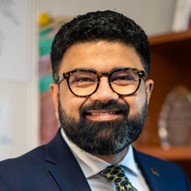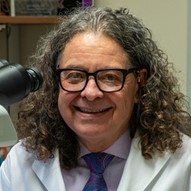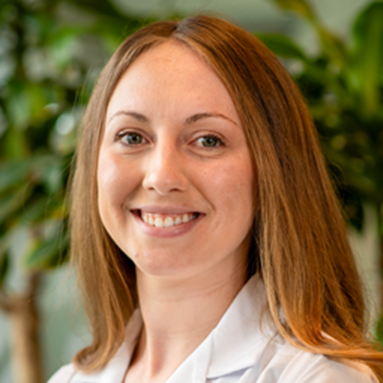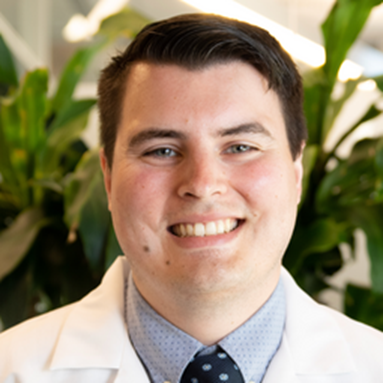

The Pathologist recently announced its Power List for 2024. Per their website, The Pathologist "solicited nominations of pathologists and laboratory professionals in any stage of their careers, who have made accomplishments in the past year in one of the following categories: (i) Heroes of Pathology; (ii) Champions for Change; (iii) Idols of Innovation; (iv) In the Wings; and (v) Destined for Excellence."
The Michigan Medicine Department of Pathology is well represented with five of our pathologists appearing in three categories.
The Heroes of Pathology are “problem solvers for those in difficulty.” We have two pathologists represented as Heroes:
 Kamran Mirza, MBBS, PhD, Godfrey Dorr Stobbe Professor of Pathology Education; Clinical Professor of Pathology (Hematopathology); Assistant Chair for Education; and Director, Division of Training Programs & Communication
Kamran Mirza, MBBS, PhD, Godfrey Dorr Stobbe Professor of Pathology Education; Clinical Professor of Pathology (Hematopathology); Assistant Chair for Education; and Director, Division of Training Programs & Communication
Mirza finds the shortage of trained pathologists and laboratory professionals to be one of the greatest challenges facing the field, compounded by the rapid advances in technology. He would like to see a comprehensive, universally accessible digital pathology platform and changes made to pathology training programs. “The current model, which often involves lengthy, highly specialized training, may not be the most efficient or effective way to prepare pathologists for the future. Instead, we should focus on a more interdisciplinary approach, integrating elements of data science, informatics, and even public health into pathology training. This would better prepare pathologists to handle the evolving demands of the field and contribute to broader healthcare goals.”
 Kelsey Hummel, DO, Gynecologic Pathology Fellow
Kelsey Hummel, DO, Gynecologic Pathology Fellow
Hummel’s experience in Peru and lower resourced countries provides her with an understanding of what can make the greatest impact in these countries, stating that “good specimen preparation and timely diagnosis will have a more sustainable impact on patient care” rather than focusing on advanced diagnostics in under-resourced settings. “These priorities will lead to better treatment outcomes and enhance the overall quality of life for patients worldwide, making them crucial aspects of healthcare.”
The Idols of Innovation category "focuses on researchers, inventors, and transformers in the field of pathology."
 Jeffrey Myers, MD, A. James French Professor of Diagnostic Pathology and Vice Chair for Clinical Affairs and Quality, was named to this list.
Jeffrey Myers, MD, A. James French Professor of Diagnostic Pathology and Vice Chair for Clinical Affairs and Quality, was named to this list.
Myers indicated that the greatest challenge facing pathology today is “Keeping pace with technology and advances in science with solutions that are scalable and applicable across a wide range of practice settings. Most struggle to clearly separate things that we should do from those that we can do.” When asked for a controversial opinion, Myers added, “Our implementation of subspecialization in academic practices is well intended but poorly executed, burdening experts with cases that don’t benefit from their subspecialized knowledge base while eroding opportunities for community-based generalists to more effectively manage a greater share of the diagnostic burden.”
In the Destined for Excellence category, which "identifies rising stars in pathology," two of our trainees made the list.
 Meredith K. Herman, DO, 2nd year AP/CP Resident.
Meredith K. Herman, DO, 2nd year AP/CP Resident.
Herman stated, “As a young pathologist, I am driven by three major goals: advancing the specialty forward, revolutionizing medical education, and fostering a culture of mentorship.” Herman is an active contributor on our @UMichPath social media accounts. She explains, “Our greatest force multiplier is making ourselves visible to future generations. In an age where social media, AI, and technologies like ChatGPT are reshaping our world at lightning speed, it is essential to adapt and embrace the digital era. One way I help recruit talented individuals to medicine, specifically pathology, is by being intentional on social media. Simple interactions like responding to messages, liking comments, and sharing content fosters community and build trust. It has amazed me how simple and impactful social media can be. Social media has not only expanded my reach but has also opened doors to new friendships, sponsorships, collaborations, and opportunities.”
 Corey Post, MD, Hematopathology Fellow
Corey Post, MD, Hematopathology Fellow
Post is excited about the advances in digital pathology and the improvements that has made in patient care. He sees a need to enhance the visibility of pathology to medical students early in their training and to raise the awareness of pathology as a career. He believes that social media is helping with this. Post adds, “I also think it's imperative that pathologists remain involved with the medical school curriculum. A current trend in medical training is to shorten the preclinical curriculum, which is reducing exposure to pathology. Pathology educators need to find new ways to engage in medical training.”
 ON THE COVER
ON THE COVER
Breast team reviewing a patient's slide. (From left to right) Ghassan Allo, Fellow; Laura Walters, Clinical Lecturer; Celina Kleer, Professor. See Article 2014Department Chair |

newsletter
INSIDE PATHOLOGYAbout Our NewsletterInside Pathology is an newsletter published by the Chairman's Office to bring news and updates from inside the department's research and to become familiar with those leading it. It is our hope that those who read it will enjoy hearing about those new and familiar, and perhaps help in furthering our research. CONTENTS
|
 ON THE COVER
ON THE COVER
Autopsy Technician draws blood while working in the Wayne County morgue. See Article 2016Department Chair |

newsletter
INSIDE PATHOLOGYAbout Our NewsletterInside Pathology is an newsletter published by the Chairman's Office to bring news and updates from inside the department's research and to become familiar with those leading it. It is our hope that those who read it will enjoy hearing about those new and familiar, and perhaps help in furthering our research. CONTENTS
|
 ON THE COVER
ON THE COVER
Dr. Sriram Venneti, MD, PhD and Postdoctoral Fellow, Chan Chung, PhD investigate pediatric brain cancer. See Article 2017Department Chair |

newsletter
INSIDE PATHOLOGYAbout Our NewsletterInside Pathology is an newsletter published by the Chairman's Office to bring news and updates from inside the department's research and to become familiar with those leading it. It is our hope that those who read it will enjoy hearing about those new and familiar, and perhaps help in furthering our research. CONTENTS
|
 ON THE COVER
ON THE COVER
Director of the Neuropathology Fellowship, Dr. Sandra Camelo-Piragua serves on the Patient and Family Advisory Council. 2018Department Chair |

newsletter
INSIDE PATHOLOGYAbout Our NewsletterInside Pathology is an newsletter published by the Chairman's Office to bring news and updates from inside the department's research and to become familiar with those leading it. It is our hope that those who read it will enjoy hearing about those new and familiar, and perhaps help in furthering our research. CONTENTS
|
 ON THE COVER
ON THE COVER
Residents Ashley Bradt (left) and William Perry work at a multi-headed scope in our new facility. 2019Department Chair |

newsletter
INSIDE PATHOLOGYAbout Our NewsletterInside Pathology is an newsletter published by the Chairman's Office to bring news and updates from inside the department's research and to become familiar with those leading it. It is our hope that those who read it will enjoy hearing about those new and familiar, and perhaps help in furthering our research. CONTENTS
|
 ON THE COVER
ON THE COVER
Dr. Kristine Konopka (right) instructing residents while using a multi-headed microscope. 2020Department Chair |

newsletter
INSIDE PATHOLOGYAbout Our NewsletterInside Pathology is an newsletter published by the Chairman's Office to bring news and updates from inside the department's research and to become familiar with those leading it. It is our hope that those who read it will enjoy hearing about those new and familiar, and perhaps help in furthering our research. CONTENTS
|
 ON THE COVER
ON THE COVER
Patient specimens poised for COVID-19 PCR testing. 2021Department Chair |

newsletter
INSIDE PATHOLOGYAbout Our NewsletterInside Pathology is an newsletter published by the Chairman's Office to bring news and updates from inside the department's research and to become familiar with those leading it. It is our hope that those who read it will enjoy hearing about those new and familiar, and perhaps help in furthering our research. CONTENTS
|
 ON THE COVER
ON THE COVER
Dr. Pantanowitz demonstrates using machine learning in analyzing slides. 2022Department Chair |

newsletter
INSIDE PATHOLOGYAbout Our NewsletterInside Pathology is an newsletter published by the Chairman's Office to bring news and updates from inside the department's research and to become familiar with those leading it. It is our hope that those who read it will enjoy hearing about those new and familiar, and perhaps help in furthering our research. CONTENTS
|
 ON THE COVER
ON THE COVER
(Left to Right) Drs. Angela Wu, Laura Lamps, and Maria Westerhoff. 2023Department Chair |

newsletter
INSIDE PATHOLOGYAbout Our NewsletterInside Pathology is an newsletter published by the Chairman's Office to bring news and updates from inside the department's research and to become familiar with those leading it. It is our hope that those who read it will enjoy hearing about those new and familiar, and perhaps help in furthering our research. CONTENTS
|
 ON THE COVER
ON THE COVER
Illustration representing the various machines and processing used within our labs. 2024Department Chair |

newsletter
INSIDE PATHOLOGYAbout Our NewsletterInside Pathology is an newsletter published by the Chairman's Office to bring news and updates from inside the department's research and to become familiar with those leading it. It is our hope that those who read it will enjoy hearing about those new and familiar, and perhaps help in furthering our research. CONTENTS
|
 ON THE COVER
ON THE COVER
Rendering of the D. Dan and Betty Khn Health Care Pavilion. Credit: HOK 2025Department Chair |

newsletter
INSIDE PATHOLOGYAbout Our NewsletterInside Pathology is an newsletter published by the Chairman's Office to bring news and updates from inside the department's research and to become familiar with those leading it. It is our hope that those who read it will enjoy hearing about those new and familiar, and perhaps help in furthering our research. CONTENTS
|

MLabs, established in 1985, functions as a portal to provide pathologists, hospitals. and other reference laboratories access to the faculty, staff and laboratories of the University of Michigan Health System’s Department of Pathology. MLabs is a recognized leader for advanced molecular diagnostic testing, helpful consultants and exceptional customer service.